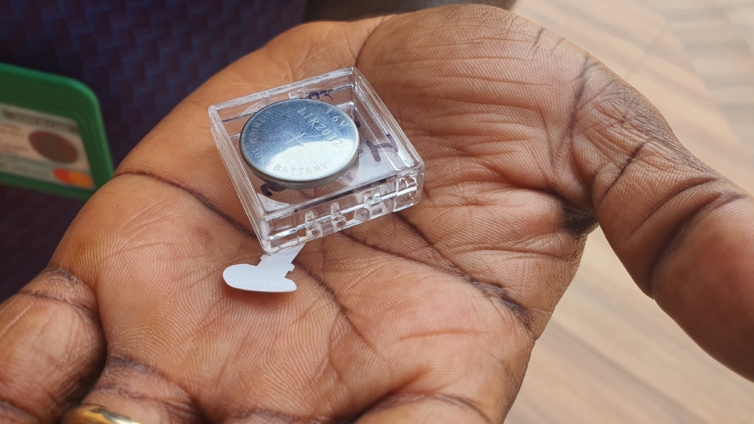A team of researchers from the Kwame Nkrumah University of Science and Technology has unveiled an innovative and sustainable method to produce high-performance batteries, using taro (Kooko or brobe) peels.
The process, which is both cost-effective and environmentally friendly, has the potential to revolutionize the energy storage industry.
The innovation highlighted in the journal “Energy Storage” used advanced scientific processes to convert the taro peels into activated carbon with enhanced performance.
Dr Daniel Nframah Ampong, the lead researcher and a member of the KNUST Center for Engineering Materials Research (KCEMR) group, explained their approach. “We used an environmentally friendly approach to synthesize activated carbon from taro peels. These waste materials contain some properties or functional groups that we believed at the time would enhance the performance of energy storage devices.”
He went on to explain the significance of their choice of material: “The commercially available activated carbons on the market are usually synthesized from chemicals and methods that are toxic, hazardous, and expensive. So, we decided to come down to our level and use the process of producing charcoal in our villages. We mimicked that process using crucibles, and at the end, we were able to synthesize the activated carbon, which had similar properties to the commercially available activated carbons,” he said.
The resultant material demonstrated exceptional results in laboratory tests.
The use of biomass and biowaste resources like taro peels not only addresses environmental concerns but also promotes the development of sustainable renewable energy technologies.
“The purpose of the research is to get some storage systems to store renewable energies when they are in excess so that when we need them, we would be able to utilize it effectively since the country is advocating for increasing renewable energy in our energy generation mix. We want to produce something that is eco-friendly with a cheap synthesis process, and the starting materials are locally available,” Dr Ampong added.
Professor Kwadwo Mensah-Darkwa, Dr Ampong’s supervisor and Research Lead of the energy materials research group, highlighted the exciting strides being made in the lab to harness biowaste materials for eco-friendly energy solutions.
“There has been a lot of development trying to use these biowaste materials mostly to drive our energy storage agenda. The plan is we want to get an eco-friendly way of creating materials for energy storage devices. This is what we are looking forward to at our lab.”
Prof Mensah-Darkwa expressed optimism about the future of their research.
“While some tests had previously required travel, the recent establishment of a new materials laboratory through the KNUST Engineering Education Programme (KEEP) has made a major difference.”
We have equipment now where we can test these assembled cells. So now the output of our research is going to be quite effective, and we would be able to look at all other opportunities we have. However, the synthesized materials ought to be characterized by techniques to confirm the actual material properties needed for specific applications, which we currently lack as a department."
He also spoke of the long-term potential of their work: "We know that there is opportunity in this area, and if we build on our expertise, then we can now look at how to scale it up and how to make an impact. We are a little bit far from building our own batteries, but we are close to understanding how we can do these things locally," he explained.
Latest Stories
-
Frema Foundation Launches ‘Dignity in Bloom’ initiative to tackle period poverty in Ashanti Region
13 minutes -
Mayor of Accra calls for renewed commitment to climate action as city commemorates June 3 disaster
13 minutes -
Declaration of assets: Special Prosecutor should lead call for asset publication – Dafeamekpor
22 minutes -
Empower360 completes third training session for 30 young women under Ghana Grows Program
1 hour -
Sudan: A new gov’t amid escalating military-political conflicts and a deepening humanitarian crisis
1 hour -
National Vaccine Institute makes impressive strides, activate measures for drug production
1 hour -
Ministry of Works and Housing signs MoU for water exploration in Ghana
2 hours -
Tree for Life initiative takes off
2 hours -
FDA destroys counterfeit pharmaceutical products worth GH₵42m
2 hours -
First responsibly mined Ghanaian gold bars presented to Asantehene
3 hours -
Two notorious robbers jailed for a series of attacks in Wa
3 hours -
Ofori-Atta must first be arrested before any trial in absentia – OSP clarifies
3 hours -
QNET reaffirms ethical business practices following false media allegations in Ghana and Burkina Faso
4 hours -
OSP declaring Ofori-Atta wanted over bruised ego – Miracles Aboagye
4 hours -
OSP must necessarily be aggressive but presumption of innocence is fundamental – Kofi Bentil
4 hours

